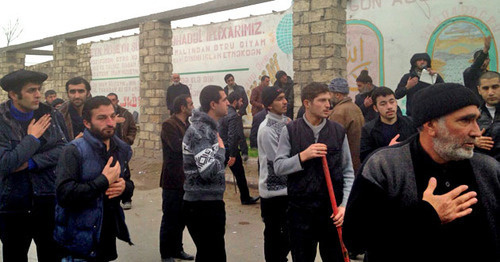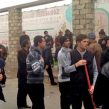
‘A Syrian Echo in Azerbaijan’? Shiites, Police Clash in Nardaran
Publication: Eurasia Daily Monitor Volume: 12 Issue: 214
By:

Clashes between the police and residents of the long-troubled Absheron peninsula city of Nardaran, on November 25–26, have resulted in numerous arrests and deaths. These deadly incidents have sparked concerns that Azerbaijan may be on the brink of more widespread religious-based conflicts of the kind that have torn apart several countries in the Middle East, in recent years. And such concerns have been exacerbated by the fact that the authorities have cut off the town from the outside world and launched a widespread campaign to portray the events as insignificant (Kavkavsky Uzel, November 26).
On November 25, the Azerbaijani police arrested Talekh Bagirov, the organizer of the Muslim Unity movement and someone who had served prison time in the past for his activities. As many as 500 residents of Nardaran came out to the city’s main square to protest his arrest and demand his release. Clashes with the police broke out, resulting in five deaths among the demonstrators and two among the police; 14 people were arrested. The city residents then threw up barricades and demanded negotiations about those arrested and the return of the bodies of the dead. At that point, the authorities shut off power and telephone lines to Nardaran.
But beyond this commonly accepted broad narrative, many details and interpretations of the event remain in dispute even though the situation appears to have stabilized. Local people reject official charges that they had guns or were responsible for the deaths of the two police officers; they claim they were only seeking information about their arrested religious leader. The authorities on the other hand blame the protesters for the deaths of people they say were activist members of the Muslim Unity organization. Moreover, officials maintain that this organization, which they insist is political and has nothing to do with Islam, was behind the whole incident as part of a wider plan to carry out terrorist attacks locally and elsewhere in order to destabilize not only Nardaran but Azerbaijan as a whole (Kavkavsky Uzel, November 26).
Nardaran, located 25 kilometers from the Azerbaijani capital of Baku, has long been a hotbed of anti-government attitudes and activities, according to local blogger Kyamal Ali. He writes that “residents of the settlement have demonstratively not taken part in elections, and [they] deified everything Iranian, but the religious slogans there are written in Cyrillic script,” not Persido-Arabic. “They do not recognize Turkey and the Latin script.” Moreover, local women wear the hijab. He suggests that the Nardaran events were “an echo of what is occurring in Syria” and that is why the authorities intervened so forcefully (Kavkavsky Uzel, accessed December 1).
Another commentator, Tofig Tyurkel of the Turan news agency, provides a somewhat broader perspective. He notes that “reliable information about what has taken place in Nardaran is not available. Official information is very sketchy, and the stories of local residents do not correspondent with the official version.” Consequently, one has to draw one’s own conclusions. In his view, the authorities interpreted the events of November 25–26 to be a manifestation of political Islam and a threat to the stability of the country, and acted accordingly. From their perspective, the Muslim Unity movement threatens the preservation of Azerbaijan as a secular state (Kavkavsky Uzel, November 27).
But a third commentator, Khikmet Gadzhizade of the Far Center for Political and Economic Research, suggests that one must put this incident into a wider context. “In Azerbaijan now,” he argues, “as a result of the systemic limitation of democratic freedoms, there practically does not remain a secular opposition. There remain only individual dissidents. The ideological vacuum that has arisen can be filled by political Islam, and the basis for this [is driven by] social problems like poverty, unemployment, and the low educational level of the population” (Kavkavsky Uzel, November 27).
Gadzhizade continues by stressing that, at present, the prospects for the strengthening of political Islam in Azerbaijan “are not as great as they are in Arab countries and Iran” because “there are no institutional bases in the form of centers of religious thought. But in the middle term, if Azerbaijan does not make use of the chances for European integration and the carrying out of democratic reforms, the situation could change” (Kavkavsky Uzel, November 27).
Up to now, the Nardaran events have attracted little attention in the West given the war in Syria and especially the downing of the Russian plane over Turkey; but in Europe at least, it is likely that they will resonate at least in some governments. The representative of the Organization for Security and Cooperation in Europe (OSCE) in Azerbaijan has called upon the Azerbaijani government to investigate attacks on journalists seeking to cover these events, and that call is certain to be repeated and lead to hearings in Europe (Kavkavsky Uzel, November 28).
Consequently, more information about these events is likely to emerge in the future. But the big question is whether similar violent clashes will be repeated in a country that is two-thirds Shia and one-third Sunni and committed to a secular path of development, or whether they will prove to be an isolated incident as some in Baku insist. One can hope for the latter, but in the current international environment, the former is all too real a risk to ignore.




